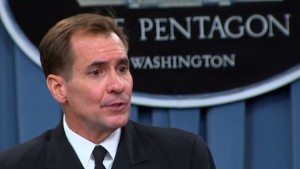August 23, 2014 -- Updated 0439 GMT (1239 HKT)
Washington (CNN) -- After three years of avoiding it,
President Barack Obama finds himself being pushed toward military action in
Syria.
Defense Secretary Chuck Hagel and Joint Chiefs Chairman
Gen. Martin Dempsey both made clear that defeating Islamic State jihadists'
rampage through northern Iraq would require going after them in neighboring
Syria.
"That will have to be addressed on both sides of
what is essentially at this point a non-existent border," Dempsey told
reporters Thursday.
On Friday, Deputy National Security Adviser Ben Rhodes
said the administration was looking beyond the current airstrikes within Iraq's
borders.



"If we see plotting against Americans, see a threat to the United States emanating from anywhere, we stand ready to take action against that threat," Rhodes told reporters.
The United States is already gathering intelligence on the locations of ISIS leadership and troops in Syria, two U.S. officials said.
Separately, U.S. officials said the military has been talking about increasing airstrikes in Iraq and possibly carrying out tailored airstrikes inside Syria against ISIS targets.
ISIS savagery
The ISIS fighters are helping Obama make his case with their savagery, which includes mass killings, abductions and other atrocities, such as the video-taped beheading of captured American journalist James Foley.
But the President, who has declined to arm rebels fighting the government of Syrian President Bashar al-Assad, faces a policy change certain to embolden critics in both parties of his reticence back then.
Obama had avoided what he called reckless interventions of the past, particularly the Iraq War, launched by his predecessor.
Critics could argue that Obama's decision to previously keep out of the Syrian conflict contributed to ISIS' growth.
His former secretary of state, Hillary Clinton, has distanced herself from him on Syria strategy during his first term as she prepares for a possible presidential run in 2016.
Legal barrier evaporated
The Obama administration has acknowledged sending U.S. forces into Syria earlier this year in a failed attempt to free Foley.
That established a precedent of acting in Syria to protect U.S. citizens and interests, superseding any legal considerations such as being asked by the host government to enter, argued Frederic Hof, Obama's former point man on Syria.
"There's a pretty good possibility that we and/or some kind of multinational effort will engage in hitting ISIS targets inside Syria," he said.
Iraq escalation
Obama already escalated U.S. military involvement in Iraq to combat ISIS less than three years after ending a lengthy war there.
In June, he sent military advisers to work with Iraqi and Kurdish forces against the lightning ISIS sweep through the north. Earlier this month, the President authorized limited airstrikes on ISIS targets and sent additional advisers to Iraq to protect U.S. personnel and minority groups threatened by the Sunni extremists.
Hagel emphasized the ISIS threat on Thursday.
"They marry ideology, a sophistication of strategic and tactical military prowess. They are tremendously well-funded," he told reporters. "This is beyond anything that we've seen."
Broad-based approach
Hagel and Dempsey also said that defeating ISIS requires a broad-based approach that includes forging an international coalition and better governance in Iraq and Syria to build public opposition to the extremists.
"Political reform will make it harder for (ISIS) to exploit sectarian divisions," Hagel said. The United States and other powers will shore up Iraq at the same time.
The United States should build a coalition against ISIS that includes regional countries such as Turkey, Saudi Arabia, United Arab Emirates, Qatar and Jordan that can contribute air power -- much of it provided by America, Hof said.
"All agree at some level or another that ISIS presents a threat," he noted.
Risky move
U.S. bombs exploding in Syria also would allow Islamic extremists to argue that America remains an imperialist bully. That could play into ISIS' hands.
"You have an adversary that is so proud of its accomplishments and so driven by its ideology that they want to appear on the world stage as our peer," said Philip Mudd, a former CIA counterterrorism official.
Strikes could boost their fund raising and recruiting.
At the same time, Mudd says, if the United States wants to really hurt ISIS, it has to strike at its base -- which is Syria.
But that also could empower al-Assad, who has long dismissed the uprising against his leadership as a fight against terrorists, Hof said.
Until now, al-Assad has allowed ISIS to grow in Syria because it joins his government in fighting the anti-government forces.
However, ISIS fighters have taken over rebel-held territory and even some government-held areas, causing al-Assad to launch airstrikes against them in some places.
Al-Assad's strategy
"This is basically two criminal gangs who often in effect collaborate but now have a difference over real money over who controls oil fields and the like," Hof said of the relationship between al-Assad and ISIS.
Wiping out the Syrian opposition would leave only ISIS and al-Assad, who would then position himself to the West as the lesser of two evils and an ally in fighting the jihadists, Hof said.
American public opinion
Intervention abroad has become unpopular with many Americans, weary from long wars in Iraq and Afghanistan.
Obama "needs to reassure people that this effort does not presage boots on the ground or some kind of repeat of the Iraq experience," Hof said.
Rhodes called Obama "very deliberate toward the use of force."
"The American people also understand that there's some threats that have to be dealt with," he said.
Source: http://edition.cnn.com/


No comments:
Post a Comment